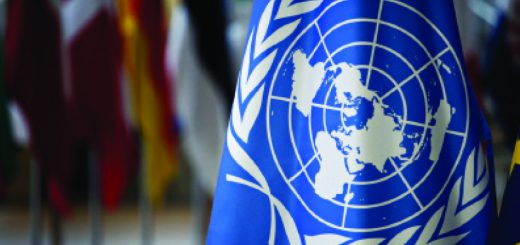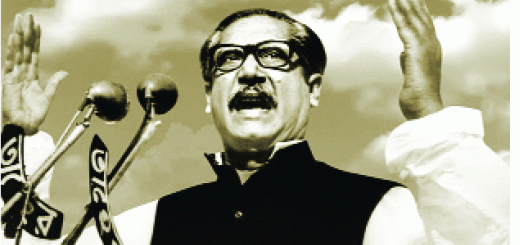Clash of Civilisations Sounds Exaggerated -Ahmed Abdullah Muhtadi
In 1996, in his book ‘The Clash of Civilisations and the Remaking of World Order’, Samuel Huntington argued that the post-Cold War future of global conflicts would be fought between civilisations and that there would be clashes between the Christian West and Islamic and Sinic Civilisations of the East. In order to prove or disprove the validity of such a theory, one must first examine the extent of these clashes, and of course, assess his classifications of these civilisations to see whether such divisions even exist in the first place. Using these methods, it should be starkly clear that the idea of a global clash of civilisations in the view that Huntington predicted, as of now, is little more than an exaggerated fiction.
Huntington believes that the conflicts between the west and the Islamic east are inevitable and after looking back centuries, this may be a logical conclusion for many when remembering the Crusades, the Colonisation of much of the Islamic world, the expansion of the early Caliphates etc. However, in our view, constructing predictions of the near future by using the conflicts of the far past as evidence, is rather problematic as it fails to show the huge progress of centuries in between. After Israel, the closest ally of the US in the Middle East is none other than the Kingdom of Saudi Arabia, which houses within it, the two most sacred sites of Islam. Trade between the west and the Islamic nations of the Middle East go back decades, with the discovery of oil being one of the largest factors in making these countries become allies of one another. The relationship between the West and Islam has not always been about religious war and conflict, and at many times, especially in recent decades, it has been one full of cooperation and trade. The end to such a relationship is mutually harmful for both parties, and thus the idea of Islam or the West wanting to clash with the other is frankly irrational. Even in fields where many thought a dispute would inevitably ignite into an ideological war (such as with the issue of Israel-Palestine), there has been a gradual shift towards a quietening down of hostilities, as shown by the recognition of Israel by multiple Arab countries in the past two years. Whether or not this is a good thing is a topic of debate for the citizens of the land, but from an overarching perspective, it is clearly obvious that influential state actors of the Islamic Civilisation are clearly in favour of a slow move away from hostilities. However, it is, no doubt, important to address the elephant in the room and admit that at times, the actions of the Muslim states may not always align with the popular demands of its citizens, and as a result, some have expressed their frustration towards the cooperation between the Islamic World and the West, and at times, they have committed actions that perfectly align with the theory of the clash of civilisations.
The most infamous of these actions is, of course, the 9/11 attacks when the terrorist group, Al Qaeda, destroyed the One Trade Centre in New York after hijacking planes which it crashed into the twin towers. The killing of thousands of innocent people by a group that claims that it had done it in the name of Islam and opposition to the west, proves that a certain degree of tension between the west and Islam does, in fact, exist and at times, this tension manifests itself in heinous attacks against western civilians. And the fact that Al Qaeda shares the goal of destroying the west and western influence in the name of Islam with so many other groups such as ISIS in Syria and Iraq, Al Shabab in Somalia, Boko Haram (which literally translates to ‘western education is forbidden) in Nigeria, may be further evidence for some that, not only is a clash between the west and Islam inevitable, but it is clearly a global problem. Though there are two things common about all of these groups, that could disprove such a theory. Firstly, none of these groups have the majority support of the Muslims around the world (or even in their country of operation), thus showing that this is far from a clash between the west and Islam as a whole. Secondly, all of them are non-state actors, which means that they do not have any real legal legitimacy over the relatively small amounts of land that they do control, and additionally do not really represent anyone else but themselves, unlike a legitimate government that represents their country. However, there is one major exception to this, and that is Taliban who control all of Afghanistan and are currently yearning for international recognition. The Taliban is now, technically a state actor, and one could use it as an example to support the theory of a clash of civilisations, but one must first ask whether or not the Taliban really work as real example of Islamic Civilisation trying to attack the West. Although the Taliban did fight Americans, they only did so in their own country of Afghanistan (unlike Al Qaeda which attacked Americans in the US). Additionally, they promised that they would not allow their nation to be used as a base to attack the west (or any other country, anywhere), and thus, one could disregard the Taliban as an example of Islamic Civilisation clashing with the west and see it more of a native civilisation fighting against an invader; although ultimately, either idea could be disproved according to whether or not the such a promise is actually fulfilled. The undeniable differences of ideology between a group like the offensive Al Qaeda and the defensive Taliban gives rise to a question that might also go on the disprove the theory of a clash of civilisations, and that is, is Islamic Civilisation really a homogenous group that aims to collectively clash with the west like Huntington claims? What about Western Civilisation?
The entire theory of a clash of civilisation is based on the rigid and oversimplistic classification of a civilisations that Huntington divides the world in. In reality, there is a lot of infighting within Islamic Civilisation and this refutes the basic idea of there being a homogenous Islamic Civilisation in the first place. Iran and Saudi Arabia, for example, have a huge rivalry between them and both are friendly with some non-Islamic countries (for instance, USA for Saudi Arabia and Russia for Iran) than they are with each other, even though both are Islamic. Turkey and Qatar, while both being predominantly Muslim countries that are relatively friendly with the west also have many differences that ultimately accumulated into a land, sea and air blockade by the Saudis on Qatar that lasted over two years. Such infighting also goes down to the levels of non-state actors who oppose the west. In Yemen, Al Qaeda is mostly attacking groups like the Houthis who also claim to be Muslim (although they are Shia, unlike Al Qaeda). In Syria, ISIS was fighting both the Syrian Army, but also other rebels, who both claim to be Muslim. For the rebels specifically, many of them actually also claimed to be Salafist, just like ISIS, but that still did not stop the infighting. All this is without even mentioning the many innocent Muslims that Al Qaeda’s attacks and ISIS’s attacks have killed, Muslims who aren’t even part of this ideological civil war to begin with. The Islamic Civilisation that Huntington describes is full of so much infighting and so many different dominations that at many points, parts of it seem more like Western Civilisation than they seem to each other. If one assesses how much fighting these groups have done against the west, compared to how much fighting these groups have done against other Muslims, it would seem as though they are bigger enemies of other Muslims than they are to the west. Huntington uses attacks by Islamist Terrorists against the west to claim that there is a clash of civilisation. By using this same logic, we could conclude that there is an even bigger clash within Islamic Civilisation (both for state and non-state actors and both for those who oppose the west and don’t) and thus the idea of there being a homogenous Islamic Civilisation in the first place is automatically disproven. It seems much more like there is a general clash between groups and countries in the world, clashes which often times completely ignore the fact that it is happening within a ‘civilisation’. If so much infighting happens within Islamic Civilisation, then what about the supposed ‘enemy’ of the west? Is the West a homogenous group that collectively aims to clash with Islamic and Sinic Civilisations, or is it also divided from within?
The fact is that Huntington’s own Western Civilisation is also very divided. Organisations like NATO and the EU have been established by the west as methods of inter-‘civilizational’ cooperation and dialogue but in recent years, they have been shown to not be as effective as previously imagined. While the US and UK waged a war against Saddam’s Iraq, some of their NATO allies such as France and Germany bitterly opposed it. The war of Russia-Ukraine— though both of them are predominantly Christian— is another example. In many cases, divisions among the leaders within western IGOs could be so bad that it causes a member state to leave. Such was the example of Britain’s decision to leave the EU in 2016, that has since then made the countries relationship with the European continent much more complicated and uneasy. While divisions between the west haven’t really ignited into a war ever since the fall of the Soviet Union, this does not mean that tensions between them haven’t been severe. For example, in recent months, tensions between France and Australia have become extremely high after the latter neglected a deal that involved the buying of diesel-powered French submarines for Australian Navy. The scrapping of that deal was a result of Australia deciding to buy British and American nuclear submarines instead, supposedly without even mentioning it to the French government. Dubbed the ‘Aukus’ Pact, this new deal proved to be a subject of huge tension between supposed Western and NATO (for UK and USA) allies, and even caused France to withdraw their ambassadors in Australia and America. If the world was truly divided into homogenous civilisations, then such acts of betrayal and such high levels of tension would not occur within civilisations. Rather, states within a civilisation should’ve found themselves to be natural allies, which clearly is not always the case.
As well as arguing that there is a clash of civilisations between the Islamic and the Western Civilisations, Huntington also explains how a clash between the west and China (or Sinic Civilisation as he calls it) is also very likely. In the past 30 years, China has been rapidly growing and has very quickly caught up with the growth of the west. It has transformed its economy from a weak agriculture base to a very strong and a very large industrial one. Nowadays, it has often been described as the ‘workhouse of the globe’ because of the huge amounts of manufacturing that takes place in the country. With such significant, fast-paced growth, China naturally finds itself at odds with the west which sees that it is competing with it for influence over other nations. Huntington believes that such rivalry will inevitably lead to war, especially now since both nations are nuclear armed and have a powerful army and navy. Places like Taiwan (China’s neighbour but America’s ally) may become a flashpoint for any future clash, proving Huntington’s theory correct. However, we do not believe that it is in the interests of either nation to go to war with the other. The US and China are huge trading partners and millions of goods per year are imported to the US from China. If a war takes place, this trade will halt and have a dangerous effect on the American economy. As well as this, a war between the two states may involve the use of deadly nuclear weapons which will inevitably lead to a massive and unnecessary loss of human lives that neither side wants. Even in a case where nuclear weapons aren’t used, a war between the two superpowers is guaranteed to be extremely costly and thus once again, put a great unwanted burden on their economies. While we do expect Sino-American rivalry to continue, the chances of a conflict that Huntington predicts, in our views, seems quite unlikely, as of now, and greatly damaging for both sides.
In conclusion, it is clear that Huntington’s theory of the clash of civilisations simply has far too many flaws to be a realistic explanation of what the future of global conflicts will look like. There is far too much cooperation between Sinic and Western Civilisations and Islamic and Western Civilisations to make a war between them. Wherever there has been a clash between the West and Islam, it has been done by a non-state actor or by an insurgency that is less bothered about a global clash and more bothered about expelling invaders from their country (as it is with the example of the Taliban in Afghanistan). Additionally, this idea of a global clash of civilisation firstly relies on the assumption that such homogenous civilisations actually exists, and if one looks at the quarrels and divisions within western civilisation and the conflicts and sectarianism within Islamic civilisation, it would be clear that actors in a conflict care little about the grouping on the basis of civilisations. Therefore, it can be said that the extent of a global clash exclusively between civilisations is actually relatively little and does not live up to the high level of significance that Huntington gives it.
















Recent Comments